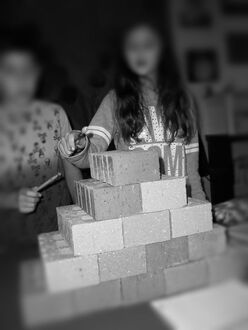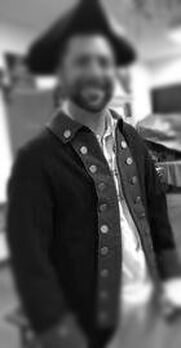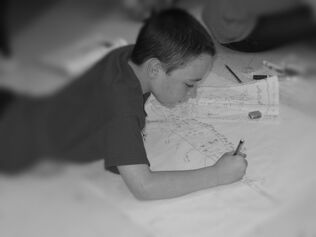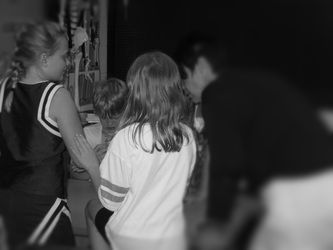too high and falling short;
but in setting our aim too low, and achieving our mark."
(Michelangelo)
|
"The greater danger for most of us lies not in setting our aim
too high and falling short; but in setting our aim too low, and achieving our mark." (Michelangelo)
0 Comments
I've covered a lot of ground in the first three installments of this series or mythbusters about teaching history. In he first, I wrote about history being boring. This installment will cover the same subject with a new myth and some new ideas in response. Here is the myth: History is All lecture and text reading. Surgery Surgery
 Finding Patterns in Jefferson's Bricks Finding Patterns in Jefferson's Bricks
 Our Principal's Costume Fitting Our Principal's Costume Fitting
In short, get your noses out of the book. Get your students outside the four walls of the classroom from time to time. Bring it to life for them. History should never be all lecture and text reading. Together, we can create better thinkers and better citizens by keeping everyone engaged and thinking!
Sometimes, when we go to the movies or as we watch a show on TV, we are transported into the plot. Directors understand that their selection of background music can change and enhance a scene. Now it is time to turn it around. This time, the music comes first. Do not watch the video; instead, let the music lead your imagination. As it plays, allow it to transport you into a scene that has yet to be written. Then, write the scene. Use all the visual imagery you can muster in your writing. At the end, you will share your writing. Will it stand on its own, without the music in the background?
Well, I picked the wrong time to read this one. The Night Diary is about a time when Pakistan was breaking from India. Set in 1947, a doctor and his children are forced to move from their current house, which will soon be Muslim-controlled Pakistan. The trio, along with a grandmother, become refugees, fleeing to Hindu-dominated India - a dangerous time, when two religions refused to accomadate one another cordially. Along the way, the children witness starvation, dehydration, attack, and murder. The story is a dark telling of a tragic time where two groups are rioting - destroying property and lives and attacking each other rather than sitting down together and solving their problems and disagreements. I have to tell you, it was hard to read this book during a time when I needed to breathe. I needed relief from watching live riots in our own time, I rather needed some relief, and this book was not the way to get it.
The book was well-written, and I would have enjoyed reading it any other time. I learned something about the history of the region that I had never studied.
The family took another trip to Children's Mercy Hospital in Kansas City, last week. While my daughter was meeting with her neurologist, my son and I made a visit to the nearby World War I Memorial. Unfortunately, we still did not have the time to tour the museum inside, and we were there too early in the morning anyway, but we made sure we walked around the other side of the facility, after missing it when we were there last. As long as we were "getting our steps in", we crossed the street for a visit to Union Station. The facility was open and readying for business at its theaters, food venues, and museums, but again, it was too early in the morning to witness much activity. Still, that's one of the best times to appreciate the structure itself. Out front the T-Rex proudly sported its CVD19 mask to remind passersby that he's not going to ever be caught in another extinction event. Returning to the car, still freely parks at the top of the memorial hill, we were intrigued by the handicapped tree that was using a "crutch" to hold up its deformed old arm.
This is definitely an area to consider returning to in the future, as there is too much that we have yet to see. I count this as a followup to last year's teacher institute at Fort Ticonderoga in Upstate New York, where I was able to spend a week comparing and contrasting World War Zero (the French and Indian War) and World War One.
Fatherly JestsLet's have some fun! Can you remake your own Dad Jokes to sound like they are being told in the 17th Century? Here are some examples:
"You should take the approach that you are wrong.
Your goal is to be less wrong." Elon Musk Requiring students to recalling rote information is not the most inspiration of teaching goals. These days, our youth need to be able to find information, discern the truth of sources, form opinions, and present information. I wonder why teachers still insist on doling out constructed response exams expecting closed responses. That's probably why we have students telling us the following myth: History is just the memorization of people, places, and dates. Map Making Map Making Or is it a myth? It certainly is in our class. That's because our focus is not on regurgitating information. Here are my thoughts and suggestions.
 Murrah Federal Building, Oklahoma City, 1995 Murrah Federal Building, Oklahoma City, 1995
 Valuable Conversations with Peers and Adults Valuable Conversations with Peers and Adults
We find ourselves sitting at a point where people choose to act violently on every offense and every point of anger and disagreement, rather than coming to the table, looking the opponent in the eye, and have a discussion. Maybe that will be a positive end result of present conflicts. It would be nice to be able to skip the destruction and go straight to the conversation, wouldn't it? That can only happen if education gets on board with teaching history up front and not poking in a pile and calling it non-essential.
Sometimes, when we go to the movies or as we watch a show on TV, we are transported into the plot. Directors understand that their selection of background music can change and enhance a scene. Now it is time to turn it around. This time, the music comes first. Do not watch the video; instead, let the music lead your imagination. As it plays, allow it to transport you into a scene that has yet to be written. Then, write the scene. Use all the visual imagery you can muster in your writing. At the end, you will share your writing. Will it stand on its own, without the music in the background?
I am not a fan of The Truth as Told by Mason Buttle.
I have several reasons for not enjoying this book, mostly based on my own morals, language and relationship preferences being most prominent. I cringed every time the bullying boys called Mason and Calvin inappropriate, derogatory names. Without getting into that here, the writing style missed the mark. I never could get over the broken and incomplete sentences throughout every page. I understand they are there to stylize and establish voice, but it really gets in the way with calculated intention. In other words, it made me think about the author more than the characters in the story.
IN CONGRESS, July 4, 1776. The unanimous Declaration of the thirteen united States of America, When in the Course of human events, it becomes necessary for one people to dissolve the political bands which have connected them with another, and to assume among the powers of the earth, the separate and equal station to which the Laws of Nature and of Nature's God entitle them, a decent respect to the opinions of mankind requires that they should declare the causes which impel them to the separation. We hold these truths to be self-evident, that all men are created equal, that they are endowed by their Creator with certain unalienable Rights, that among these are Life, Liberty and the pursuit of Happiness.--That to secure these rights, Governments are instituted among Men, deriving their just powers from the consent of the governed, --That whenever any Form of Government becomes destructive of these ends, it is the Right of the People to alter or to abolish it, and to institute new Government, laying its foundation on such principles and organizing its powers in such form, as to them shall seem most likely to effect their Safety and Happiness. Prudence, indeed, will dictate that Governments long established should not be changed for light and transient causes; and accordingly all experience hath shewn, that mankind are more disposed to suffer, while evils are sufferable, than to right themselves by abolishing the forms to which they are accustomed. But when a long train of abuses and usurpations, pursuing invariably the same Object evinces a design to reduce them under absolute Despotism, it is their right, it is their duty, to throw off such Government, and to provide new Guards for their future security.--Such has been the patient sufferance of these Colonies; and such is now the necessity which constrains them to alter their former Systems of Government. The history of the present King of Great Britain is a history of repeated injuries and usurpations, all having in direct object the establishment of an absolute Tyranny over these States. To prove this, let Facts be submitted to a candid world. He has refused his Assent to Laws, the most wholesome and necessary for the public good. He has forbidden his Governors to pass Laws of immediate and pressing importance, unless suspended in their operation till his Assent should be obtained; and when so suspended, he has utterly neglected to attend to them. He has refused to pass other Laws for the accommodation of large districts of people, unless those people would relinquish the right of Representation in the Legislature, a right inestimable to them and formidable to tyrants only. He has called together legislative bodies at places unusual, uncomfortable, and distant from the depository of their public Records, for the sole purpose of fatiguing them into compliance with his measures. He has dissolved Representative Houses repeatedly, for opposing with manly firmness his invasions on the rights of the people. He has refused for a long time, after such dissolutions, to cause others to be elected; whereby the Legislative powers, incapable of Annihilation, have returned to the People at large for their exercise; the State remaining in the mean time exposed to all the dangers of invasion from without, and convulsions within. He has endeavoured to prevent the population of these States; for that purpose obstructing the Laws for Naturalization of Foreigners; refusing to pass others to encourage their migrations hither, and raising the conditions of new Appropriations of Lands. He has obstructed the Administration of Justice, by refusing his Assent to Laws for establishing Judiciary powers. He has made Judges dependent on his Will alone, for the tenure of their offices, and the amount and payment of their salaries. He has erected a multitude of New Offices, and sent hither swarms of Officers to harrass our people, and eat out their substance. He has kept among us, in times of peace, Standing Armies without the Consent of our legislatures. He has affected to render the Military independent of and superior to the Civil power. He has combined with others to subject us to a jurisdiction foreign to our constitution, and unacknowledged by our laws; giving his Assent to their Acts of pretended Legislation: For Quartering large bodies of armed troops among us: For protecting them, by a mock Trial, from punishment for any Murders which they should commit on the Inhabitants of these States: For cutting off our Trade with all parts of the world: For imposing Taxes on us without our Consent: For depriving us in many cases, of the benefits of Trial by Jury: For transporting us beyond Seas to be tried for pretended offences For abolishing the free System of English Laws in a neighbouring Province, establishing therein an Arbitrary government, and enlarging its Boundaries so as to render it at once an example and fit instrument for introducing the same absolute rule into these Colonies: For taking away our Charters, abolishing our most valuable Laws, and altering fundamentally the Forms of our Governments: For suspending our own Legislatures, and declaring themselves invested with power to legislate for us in all cases whatsoever. He has abdicated Government here, by declaring us out of his Protection and waging War against us. He has plundered our seas, ravaged our Coasts, burnt our towns, and destroyed the lives of our people. He is at this time transporting large Armies of foreign Mercenaries to compleat the works of death, desolation and tyranny, already begun with circumstances of Cruelty & perfidy scarcely paralleled in the most barbarous ages, and totally unworthy the Head of a civilized nation. He has constrained our fellow Citizens taken Captive on the high Seas to bear Arms against their Country, to become the executioners of their friends and Brethren, or to fall themselves by their Hands. He has excited domestic insurrections amongst us, and has endeavoured to bring on the inhabitants of our frontiers, the merciless Indian Savages, whose known rule of warfare, is an undistinguished destruction of all ages, sexes and conditions. In every stage of these Oppressions We have Petitioned for Redress in the most humble terms: Our repeated Petitions have been answered only by repeated injury. A Prince whose character is thus marked by every act which may define a Tyrant, is unfit to be the ruler of a free people. Nor have We been wanting in attentions to our Brittish brethren. We have warned them from time to time of attempts by their legislature to extend an unwarrantable jurisdiction over us. We have reminded them of the circumstances of our emigration and settlement here. We have appealed to their native justice and magnanimity, and we have conjured them by the ties of our common kindred to disavow these usurpations, which, would inevitably interrupt our connections and correspondence. They too have been deaf to the voice of justice and of consanguinity. We must, therefore, acquiesce in the necessity, which denounces our Separation, and hold them, as we hold the rest of mankind, Enemies in War, in Peace Friends. We, therefore, the Representatives of the united States of America, in General Congress, Assembled, appealing to the Supreme Judge of the world for the rectitude of our intentions, do, in the Name, and by Authority of the good People of these Colonies, solemnly publish and declare, That these United Colonies are, and of Right ought to be Free and Independent States; that they are Absolved from all Allegiance to the British Crown, and that all political connection between them and the State of Great Britain, is and ought to be totally dissolved; and that as Free and Independent States, they have full Power to levy War, conclude Peace, contract Alliances, establish Commerce, and to do all other Acts and Things which Independent States may of right do. And for the support of this Declaration, with a firm reliance on the protection of divine Providence, we mutually pledge to each other our Lives, our Fortunes and our sacred Honor. The 56 signatures on the Declaration appear in the positions indicated:
Is this right? Is this a list of things students do not learn in school? If not, why not? I think we do a pretty good job of addressing many of the things in this list:
The author of this list is unknown, but the list has been published online by a Christian-based publisher that I follow and read. I can't be sure of the goal in publishing this list - probably something to encourage homeschooling - but I am happy to say that I try to cover these issues in our class each year. Along with soft skills and asserting your ideas respectfully, these are the kinds of things schools should be including in their social skills, civics, history, science, communication, and career readiness classes. These make up at least part of a message about personal responsibility.
Perhaps there is a political message here, as well; I suppose that is possible. Maybe someone is asserting in this list that you are not entitled to something that you do not deserve or earn. I don't know if that is political or not. We used to call this, if you didn't learn it early, the School of Hard Knocks. It's probably best that you learn this now, and not wait until you expect something that you're not going to get. Yes, be a child while you are a child - live in Neverland for a while longer - but realize that there will come a time when you have to step up to the plate, toe the line, and work hard. |
AnthemThe Hoggatteer Revolution
is an extensive, award-winning, inimitable, digital platform for Encouraging and Developing the Arts, Sciences, and honest Christianity in the beautiful, friendly LAND OF THE FREE AND THE HOME OF THE BRAVE This site is described as
"a fantastic site... chockablock full of interesting ideas, hilarious anecdotes, and useful resources." 
...to like, bookmark, pin,
tweet, and share about the site... and check in regularly for new material, posted often before DAWN'S EARLY LIGHT! History in ResidenceElementary Schools: Bring Mr. Hoggatt into your classroom for a week of engaging and rigorous history programming with your students. LEARN MORE BUILDING BETTER
|
H |
O |
P |
E |
